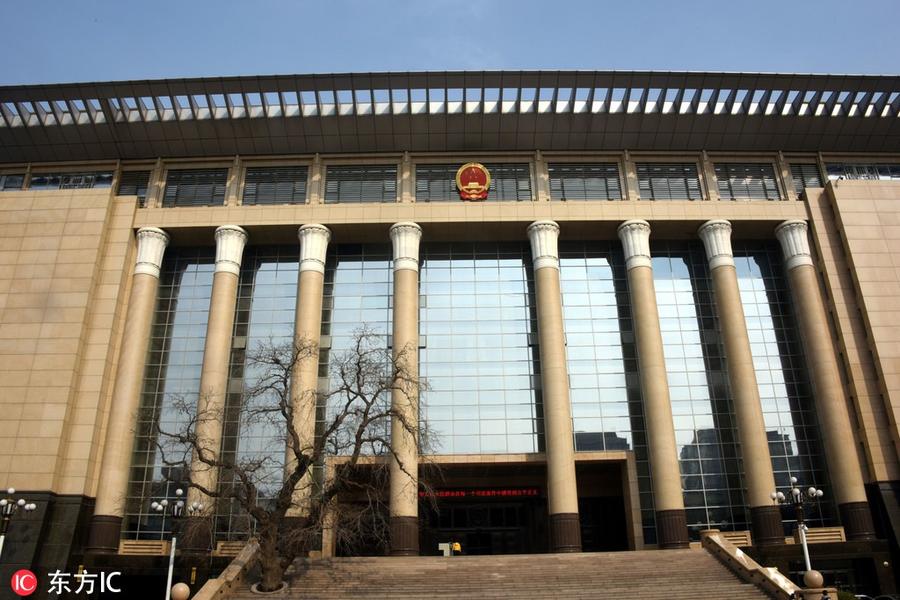 In this Jan 1, 2019 file photo, China's Supreme People's Court (SPC) would start to hear intellectual property rights (IPR) appeals that required more expertise. The country's top court has recently handed down rulings on various issues. (PHOTO / IC)
In this Jan 1, 2019 file photo, China's Supreme People's Court (SPC) would start to hear intellectual property rights (IPR) appeals that required more expertise. The country's top court has recently handed down rulings on various issues. (PHOTO / IC)
BEIJING – Chinese courts will safeguard national unity by bringing all criminals seeking to split the country to justice in accordance with the law, according to a report of the top court on Tuesday.
Efforts will be made to strictly crack down on the infiltration, sabotage, subversion and separatist activities by domestic and foreign hostile forces, read the report submitted to the national legislature for deliberation.
Property rights protection
Chinese courts will take resolute actions to protect legitimate property rights and interests of private businesses and entrepreneurs, a Supreme People's Court report said Tuesday.
Courts will work to stop illegal acts violating personality rights of entrepreneurs, support honest business operations and encourage fair competition, according to the report submitted to the ongoing session of the 14th National People's Congress, the top legislature, for deliberation.
Court trials and enforcement of verdicts never stop and justice is always served.
Supreme People's Court
Chinese courts have enhanced their protection on property rights over the past five years. From 2018 to 2022, wrong verdicts of 209 major criminal cases involving property rights had been corrected, and 290 business operators acquitted, according to the report.
Concrete actions had been taken to prevent turning business disputes into criminal prosecution, the report added.
All enterprises were treated equally no matter whether they are state-owned or private, domestic or foreign-funded, small or big, the report said.
'Intelligent courts'
Broad application of intelligence technologies in the court has made Chinese justice system stand out globally, a Supreme People's Court (SPC) report said Tuesday.
Chinese courts have made notable progress in building "intelligent courts" over the past five years. As intelligence technologies have been introduced in all aspects of court services, all legal services can be accessed via internet and all legal proceedings are open to the public in accordance with the law, according to the report, submitted to the ongoing session of the 14th National People's Congress for deliberation.
ALSO READ: China to strengthen enforcement of court orders
Powered by information and intelligence technologies, Chinese courts have stood up to the impacts of COVID-19. Since the outbreak of COVID-19 in early 2020, nearly 30 million litigation cases have been filed via a nationwide online platform and 5.04 million hearings been held via video links, according to the report.
"Court trials and enforcement of verdicts never stop and justice is always served," the report said.
Information technologies also helped improve transparency of court work. From 2018 to 2022, about 140 million legal documents were made public at a nationwide court document website with over 100 billion visits. Meanwhile, more than 21 million trials were live streamed.
The SPC took the lead in regulating the application of artificial intelligence in court services, making it clear that artificial intelligence can only assist but never replace human judges.
Higher-level opening up
Chinese courts will better serve the country's higher-level opening up by building the capacity of foreign-related justice system, a report from the Supreme People's Court (SPC) said Tuesday.
From 2018 to 2022 courts across the country concluded 95,000 foreign-related commercial cases and 76,000 maritime cases, according to the report, submitted to the ongoing session of the 14th National People's Congress (NPC) for deliberation.
A total of 10 special courts were established to handle international commercial disputes during the five years.
With an impartial, efficient and transparent maritime justice system, more and more foreign entities have chosen Chinese courts to settle their disputes, the report said.
Chinese prosecuting agencies also endeavored to protect the legitimate rights of both Chinese and foreign parties when handling more than 20,000 foreign-related criminal cases in the five years, according to a report from the Supreme People's Procuratorate, also submitted to the annual NPC session.
Personal information and cyber crimes
Chinese courts will intensify protection of personal information and strictly punish information and cybercrimes this year, according to a report submitted Tuesday by the Supreme People's Court to the national legislature for deliberation.
The report reviews the progress China has made in personal information protection. The top court has issued a judicial interpretation concerning facial recognition, and a series of cases involving infringements on privacy and personal information have been handled over the past five years.
Illegal sanction, "long-arm jurisdiction"
Chinese courts will unswervingly counter illegal sanctions and "long-arm jurisdictions" to firmly safeguard China's judicial sovereignty and people's interests.
The Supreme People's Court made the pledge in its work report submitted to the ongoing session of the national legislature for deliberation on Tuesday.
Carbon reduction
China's Supreme People's Court (SPC) on Friday issued a guideline on relevant judicial services to assist the country's efforts in achieving carbon peaking and carbon neutrality goals.
READ MORE: Guideline clarifies jurisdiction of foreign-related legal cases
With a priority on ecological restoration, the guideline outlines such efforts as better safeguarding the rights and interests related to new types of ecological resources, and steering enterprises to phase in energy-efficient and low-carbon technologies, said Liu Zhumei, a division chief at the SPC.
The guideline also specifies efforts to assist in the building of a clean, low-carbon, safe and efficient energy system in accordance with the law.
Efforts should be made to better delineate the rights and responsibilities of relevant parties entering carbon trading markets, increase market fluidity, maintain reasonable market prices, and boost the motivation of enterprises to reduce carbon emissions, according to the guideline.


